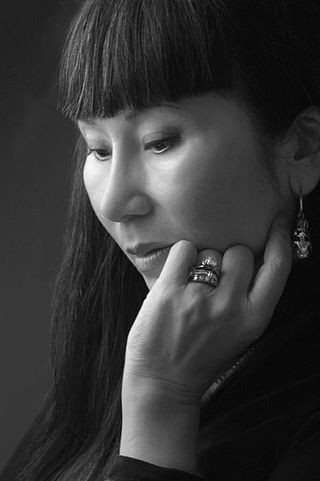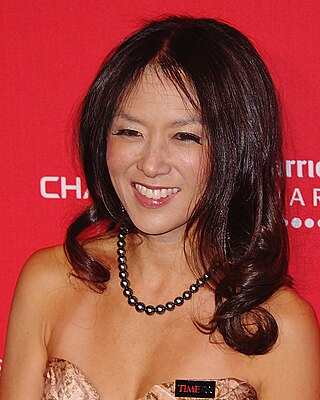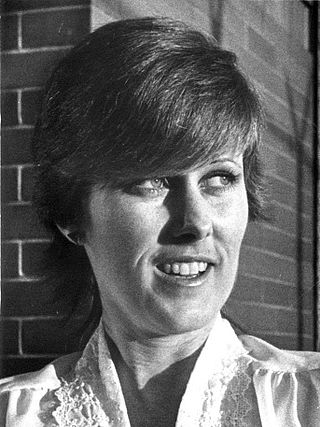
Amy Ruth Tan is an American author of Chinese heritage, best known for the novel The Joy Luck Club (1989), which was adapted into a 1993 film. She is also known for other novels, short story collections, children's books, and a memoir.

Pearl Comfort Sydenstricker Buck was an American writer and novelist. She is best known for The Good Earth, the best-selling novel in the United States in 1931 and 1932 and which won her the Pulitzer Prize in 1932. In 1938, Buck became the first American woman to win the Nobel Prize in Literature "for her rich and truly epic descriptions of peasant life in China" and for her "masterpieces", two memoir-biographies of her missionary parents.

Chelsea Victoria Clinton is an American writer and global health advocate. She is the only child of Bill Clinton, a former U.S. President, and Hillary Clinton, a former U.S. Secretary of State and 2016 presidential candidate. She was a special correspondent for NBC News from 2011 to 2014 and now works with the Clinton Foundation and Clinton Global Initiative, including taking a prominent role at the foundation with a seat on its board.

Bryan Douglas Caplan is an American economist and author. Caplan is a professor of economics at George Mason University, research fellow at the Mercatus Center, adjunct scholar at the Cato Institute, and former contributor to the Freakonomics blog and EconLog. He currently publishes his own blog, Bet on It. Caplan is a self-described "economic libertarian". The bulk of Caplan's academic work is in behavioral economics and public economics, especially public choice theory.
Soccer mom is a term that broadly refers to an American or Australian, middle-class, suburban woman who spends a significant amount of her time transporting her school-age children to youth sporting events or other activities, whether or not they are soccer related. It came into widespread use during the 1996 United States presidential election and over time has come to take on an unfavorable connotation.

A helicopter parent is a parent who pays extremely close attention to a child's or children's experiences and problems, particularly at educational institutions. Helicopter parents are so named because, like helicopters, they "hover overhead", overseeing every aspect of their child's life. A helicopter parent is also known to strictly supervise their children in all aspects of their lives, including in social interactions.
Stereotypes of East Asians in the United States are ethnic stereotypes found in American society about first-generation immigrants, and American-born citizens whose family members immigrated to the United States, from East Asian, and as well as members of the Chinese diaspora who hail from Southeast Asian countries such as Brunei, Cambodia, East Timor, Indonesia, Laos, Malaysia, Myanmar, Philippines, Singapore, Thailand, and Vietnam. Stereotypes of East Asians, like other ethnic and racial stereotypes, are often erroneously and negatively portrayed in American mainstream media, in cinema, in music, on television, in literature, on the internet, as well as in other forms of creative expression in American culture and society. Many of these commonly generalized stereotypes are largely correlative to those that are also found in other Anglosphere countries, such as in Australia, Canada, New Zealand, and the United Kingdom, as mass media are often closely interlinked between these countries.

Amy Lynn Chua, also known as "the Tiger Mom", is an American corporate lawyer, legal scholar, and writer. She is the John M. Duff Jr. Professor of Law at Yale Law School with an expertise in international business transactions, law and development, ethnic conflict, and globalization. She joined the Yale faculty in 2001 after teaching at Duke Law School for seven years. Prior to teaching, she was a corporate law associate at Cleary, Gottlieb, Steen & Hamilton.

Jennette Michelle Faye McCurdy is an American writer, director, podcaster, and former actress and singer. McCurdy's breakthrough role as Sam Puckett in the Nickelodeon sitcom iCarly (2007–2012) earned her various awards, including four Nickelodeon Kids' Choice Awards. She reprised the character in the iCarly spin-off series Sam & Cat (2013–2014) before leaving Nickelodeon. McCurdy also appeared in the television series Malcolm in the Middle (2003–2005), Zoey 101 (2005), Lincoln Heights (2007), True Jackson, VP (2009–2010), and Victorious (2012). She produced, wrote, and starred in her own webseries, What's Next for Sarah? (2014), and led the science-fiction series Between (2015–2016).

A parenting style is a pattern of behaviors, attitudes, and approaches that a parent uses when interacting with and raising their child. The study of parenting styles is based on the idea that parents differ in their patterns of parenting and that these patterns can have a significant impact on their children's development and well-being. Parenting styles are distinct from specific parenting practices, since they represent broader patterns of practices and attitudes that create an emotional climate for the child. Parenting styles also encompass the ways in which parents respond to and make demands on their children.
Jed L. Rubenfeld is an American lawyer, physiologist, constitutional scholar, a graduate from Harvard University and novelist. He is the Robert R. Slaughter Professor of Law at Yale Law School. He is an expert on constitutional law, privacy, and the First Amendment. He joined the Yale faculty in 1990 and was appointed to a full professorship in 1994. Rubenfeld has also served as a United States Representative at the Council of Europe and has taught as a visiting professor at both the Stanford Law School and the Duke University School of Law. He is also the author of two novels, including the million-copy bestseller, The Interpretation of Murder.

Elizabeth Diane Downs is an American criminal who murdered her daughter and attempted to murder her other two children near Springfield, Oregon in May 1983. Following the crimes, she made claims to police that a man had attempted to carjack her and had shot the children. She was convicted in 1984 and sentenced to life in prison plus fifty years. She briefly escaped in 1987, but was quickly recaptured. Downs has been repeatedly denied parole and psychiatrists have diagnosed her with narcissistic, histrionic, and antisocial personality disorders, with one labelling her as a “deviant sociopath.”

Harvard Girl is a book written by Liu Weihua (刘卫华) and Zhang Xinwu (张欣武), which describes how they raised their daughter, Liu Yiting (刘亦婷), to be accepted to Harvard University.
Tiger parenting is a form of strict parenting, whereby parents are highly invested in ensuring their children's success. Specifically, tiger parents push their children to attain high levels of academic achievement or success in high-status extracurricular activities such as music or sports.

Taiye Selasi is an American writer and photographer. Of Nigerian and Ghanaian origin, she describes herself as a "local" of Accra, Berlin, New York and Rome.
Princess sickness, alternatively known as princess complex, princess syndrome or princess disease, is a neologism used colloquially in East and Southeast Asia to describe a condition of narcissism and materialism in women, or "princess" behaviour. Conversely but less commonly, men with a similar outlook may be described as having "prince" sickness.

The Triple Package: How Three Unlikely Traits Explain the Rise and Fall of Cultural Groups in America is a book published in 2014 by two professors at Yale Law School, Amy Chua and her husband, Jed Rubenfeld. Amy Chua is also the author of the 2011 international bestseller, Battle Hymn of the Tiger Mother.
A tiger mother is a term for a strict or demanding mother who controls her children and pushes them to be academically successful.

The Choke Artist is the 2012 autobiography of David Yoo. His fourth book, it was published eight years after his first effort “Girls For Breakfast”. The book was a selection for the Massachusetts “Must Read” list and a 2013 Finalist for the Massachusetts Book Award.













